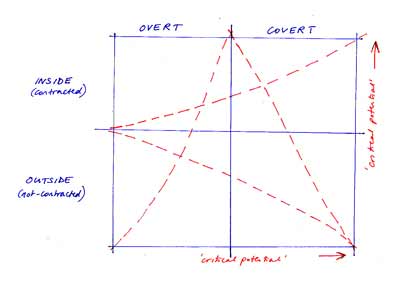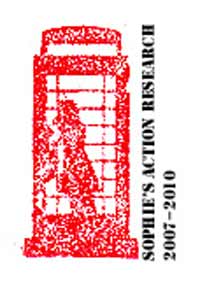Being Paid to be Critical?
Format: Presentation
Location: Spike Island, Hosts & Guests: A Setting in Search of a Celebratory
End with Can Altay and Paul O'Neill
Date: 23 November 2007
Play this while you read! The KPMG - Our Vision of Global Strategy.
I would like to talk about notions of criticality when contracted - to what
extent can you be critical of your employer when you're contracted to do
a job, how much does the contract influence your belief in the job, to what
length will you go to deliver or contravene that contract? I'm thinking
of the 'exhibition moment' or the 'setting' (outlined by Can Altay and Paul
O'Neill for this event) as the contract and the unforeseen possibilities
that can come out of that agreement.
What happens when there is no critical reflection / impulse:
Groupthink: when members of a group try to minimize conflict
and reach consensus without critically testing, analyzing, and evaluating
ideas. Usually individuals will avoid giving their own ideas because they
may be worried about coming across as stupid or don’t want to upset anyone
or rock the boat.
Haragei is another word for this practiced in Japan. Haragei
involves cooperating with a group without doubting the plan or asking why
it’s happening, or question any of the decisions for the sake of harmony.
While these situations may occur or be encouraged, we know that businesses
and public institutions are becoming wise to creativity in the work place
as a way of improving the productivity of the workforce. Encouraging individuals
to contest, speak out and inform the way the business is run is becoming
more popular. This is often carried out in the form of informal, open plan
working environments, stand-up meetings, team-building and community service
etc.
It is important for employers to ensure there is healthy competition and
good working moral - ensuring there are 'devils advocates' and even inviting
in 'princesses of persuasion' and ‘change agents’ to shake things up a bit.
Princess of persuasion article (on the right)
Chief people, progress and potential officer
Curator of the Enlightened Orchard
These elaborately named roles are fancy titles for consultants and those
working in human resources. They are still responsible for the reputation
and profits of the company. But what opportunities for dissent, contradiction
and refusal really are there within business / organisational environments
which already supposedly encourage a safe self-critique from staff?

Computer programmer inside joke – the Pairon
(image above) – launched on April fools day and includes features such as
a lever to move to standup-meeting height and a 40-hour-week alarm buzzer
built in
What are the parallels with artists' commissions and the role art plays
in marketing, branding, injecting creativity and creating bridges with communities?
[Explored by Anthony Davies and Simon Ford in 1999 in their Art Monthly
article: Art Futures. We’re not far off their year of prediction 2009.]
How do we deal with these agendas? What kind of work do we make in response
to this context? How does the setting/contract/ set of expectations etc
inform our behaviour? There is a chasm between celebration and critique
(who gets the irony, who loves to sing along to the KPMG anthem? Are these
spoof songs made by staff with a sense of humour or are they seriously made
to instill staff pride in the corporation they work for? Its hard to tell)
- how far does that knowledge and awareness of critique seep? Maybe if you
concentrate too much on the critique, you talk yourself out of your job.
Do you really want to go that far?
There must be different tactics of introducing varying levels of critique into an organization, to disrupt situations of groupthink and haragei but also that go beyond what is expected of the ideal, self-motivated, creative, eager employee. How are artists to avoid, or make use of a potential scenario where their ‘critique’ as artist in residence wins them employee of the month?
I want to introduce some different ways of working in relation to the 'setting' and to focus on one, which I'm calling the 'covert insider' (being employed not as an artist in residence but as a ‘normal’ employee) which will lead me nicely on to Mark Brogon’s film about his company/art project in Belgrade which extracts information from other companies to sell to their competitors, revealing issues around the ethics of this and how awkward a role this is for potential employees of his company.

image: a simplistic and relatively pointless drawing I've done explaining
the potential critical potential of working covertly, overtly and contracted
and un-contracted. Here, the covert insider has more potential to ‘subvert
/ critique / effect change’ over the overt insider; overt outsider is better
in this respect than covert outsider.
I want to focus on the covert insider: being contracted as someone else
other than an artist (so your artistic status is not the reason why you
got the job). I like this because it makes me think of all the people out
there with proper jobs who may not call themselves artists but work in covert
ways on a daily basis – navigating their employers, coming up with ideas
such as the PairOn and so on.
As an artist, then, what are the possible outcomes of the operations of
a 'covert insider'? What is the purpose of a silent intervention? Do you
want to reflect / effect change (if so what kind of change and why – are
you on some kind of anti-capitalist crusade or is your research more subtle
than this?) do you want to ask questions and invite others to ask questions
/ to map the effectiveness of the critique from different perspectives?
(links to investigative journalism / covert evaluator). Your work / mapping
/ intention remains invisible unless you reveal your position (and risk
loosing your job in the process) / what are the ethics of this? (depends
what you then do with the research)... How do you acknowledge and deal with
your own biases and effects on the setting and how the setting can affect
you?
To what extent is it important for you to have negotiating power as an artist
(is the label worth fighting for or can you get away with more without it?)
(e.g. manifesto and fight for professionalisation of the pubic art field)
Is being paid to be critical as an artist the ideal scenario?
How is this different from being an Ideas Ambassador?
What are the strategies of refusal, negation, subterfuge and sabotage in
the work place? - how relevant is this if you are working covertly? The
impact comes afterwards... Subversion from within
Collaboration is only possible if you declare who you are (although you
might declare a false identity)
Acknowledging the different uses and abuses of covert behaviour:
Kidbrooke Residents meeting, 5 people put their hands up – last meeting
they thought there was a spy. He produced a cutting explaining how a sister
company of Berkley Homes, the developers of Kidbooke, had employed a company
to source ‘evidence that supported their regeneration plans. The letters
of support sent to the council were not in fact signed by the people who
had supposedly signed them. PhD students had interviewed council staff,
residents etc and were thought to have been spies, gathering information
for the developers. One undercover agent managed to get voted as the chair
of one of the resident associations who were resisting the development.
These allegations were brought forward anonymously by past employees of
the company. They had left due to issues they had with the way the company
was operating.
Such subversive tactics raise issues of the ethics of not being honest
– when is this ok and when isn’t it? Who is allowed to form a critique and
who is happy to keep singing along to the tunes of the institutions, employers,
funders and policies that support and/or exploit us?
End with the Ericsson WAP rap

